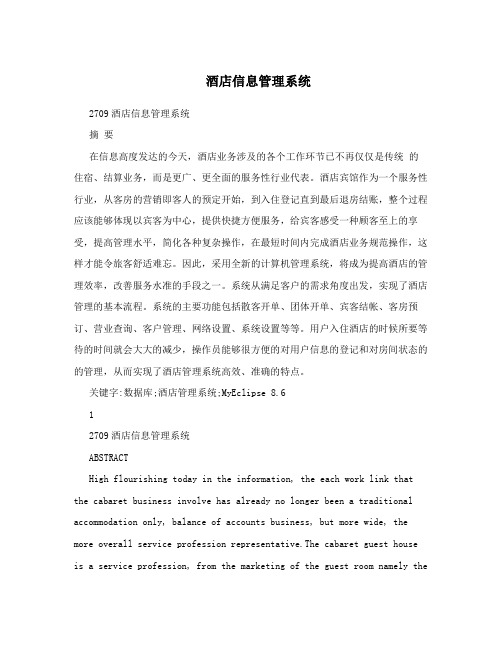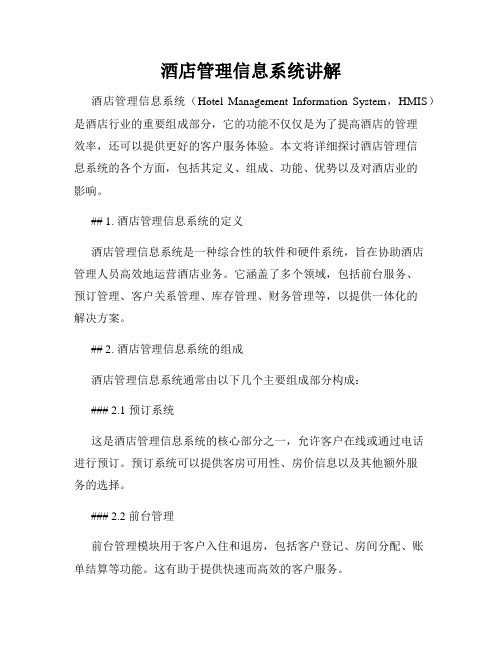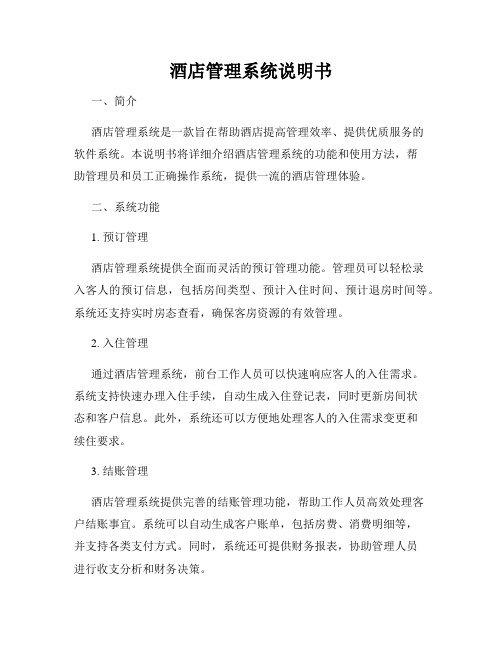酒店管理系统 Hotel Management System Integration Services 外文资料
宾馆住宿管理系统

开始职员登录客户选择类型确定入驻时间确定生成入住信息支付押金费用安排入住业务结束开始职员登录选择退房房号计算应收金额超时?生产退房信息多退少补退房成功业务结束宾馆住宿管理系统1.1 需求描述和系统边界随着电脑的快速普及以及宾馆业务量的飞速增长,宾馆管理系统越来越多的被宾馆商家渴求。
一个好的住宿管理系统可以提高宾馆的运行速度,简化客户的订房程序,因其方便快捷安全而越来越受到广大商家及客户的青睐。
宾馆住宿管理系统是以宾馆前台机器为主要对象的平台,将客户的订房开放现金结算有效整合。
客户再出示身份证明,选择好入住的房间类型后,系统将就客户的要求自动合理的分配好房间,并当场交费,以保证客户能享受到方便快捷的服务。
而工作人员也会简单的将工作简化为敲键盘击鼠标,有助于业务的开展和壮大。
一个良好的宾馆住宿管理系统需求描述如下。
该系统主要支持两种用户:前台职员和系统管理员。
前台职员主要负责客户的预定房间,将客户的信息录入、确认、还有负责收取押金和定金,在就是现住客户的接待,尽快的为客户安排合适的房间,既包括信息的录入、查询、删除等操作。
而系统管理员主要职责就是要维护管理系统和客户信息以及职员信息。
1.2 需求分析1.2.1 业务需求及流程处理NYNY1.2.2 功能需求及数据需求分析根据上述需求描述和业务流程,通过调查研究和资料搜索,宾馆住宿管理系统主要功能和数据需求包括:一、宾客入住管理:●客房预定,客户需要提供基本信息,姓名、性别、身份证号、客户编号、客房类型、抵房时间、入住人数、预定人、电话、住几天等信息,系统检查所有信息后会生成一个订房订单。
●登记入住,客户需要先说明是否已预订,之后提供姓名、性别、身份证号、客房类型、入住人数、住几天等信息,系统分配出合适的房间,交钱后直接可以入住。
●房间调整,因特殊事件导致需要调整房间,要提供包括客房编号、客房类型、客房价格、客房状态等信息,让系统及时的调整好房间,避免影响宾馆的正常运转。
酒店管理PMS系统 PMS酒店管理系统功能——集团连锁酒店管理公司2032(叶予舜)

客户入住记录查询、房间住房记录查询
住客信息
在店客人一览表、离店客人一览表
财务统计报表
营业日报表、应收账款余额表、会员消费报表
夜审
夜审操作和门店信息同步
日志查看
操作日志查看
模块
子模块
功能说明
财务管理
帐务报表
综合入账报表、综合入账明细、收款报表、收款明细、房租入账报表、结账明细表、冲调账明细表、挂账明细表、收银交接班报表
中央预订单处理
中央预订单实时获取和自动提示、可对中央预订单进行接受和拒绝操作、与总部中央预订管理系统实时无缝衔接
网站预订单处理
网站预订单实时获取和自动提示、可对网站预订单进行接受和拒绝操作、与网站预订平台实时无缝衔接
宾客列表
分类查询在住客人、分类查询离店客人、分类查询挂账客人、可按入住时间、姓名、预订和入住单号查询客人、快速查询本日将到、本日预离和本日已离客人、可按协议单位名称或编号查询协议单位客人、可按渠道商编号或名称查询渠道商客人
酒店管理PMS系统PMS酒店管理系统功能——集团连锁酒店管理公司
PMS酒店管理系统功能
模块
子模块
功能说明
预订、接待及房务
散客预订和入住
散客预订单登记、散客预订单查询和修改、散客预订单取消和恢复、确认散客预订、散客换房、宾客留言、修改入住人信息、散客预订单转入住、散客入住单登记和修改、批量预订和快速分房、到期散客续住、操作日志查看、散客联房、散客入团
模块
子模块
功能说明
客房管理
基础信息
房类信息、房价码信息
房间房类查询
房类管理、房类清单、房类表
房态管理
置干净房、置脏房、置维护房、解除维护房、置临时态、解除临时态
酒店管理信息系统

酒店管理信息系统酒店管理信息系统(Hotel Management Information System,简称HMIS)是一种集成了酒店相关运营管理功能的计算机化系统。
该系统旨在提高酒店的运营效率和服务质量,使酒店能够更好地管理客房、餐饮、前台、预订、营销等方面的业务。
首先,酒店管理信息系统提供了一种高效的客房管理方式。
传统的手工登记已经无法满足酒店客房管理的需求。
HMIS可以帮助酒店实现客房预订、入住登记、客房清洁和维护等日常操作的自动化。
通过该系统,酒店员工可以快速查询客房的可用性、价格、特殊要求等信息,提供更加便利和准确的服务。
同时,系统还可实现客房状态的实时监控,帮助酒店准确评估客房的使用情况,及时调整房态以满足客户需求。
其次,酒店管理信息系统能够有效管理餐饮服务。
酒店的餐饮服务不仅仅是提供美食,更包括餐桌预订、菜品推荐、订单处理、库存管理、员工排班等方面的工作。
通过HMIS,酒店可以实现订餐系统的自动化,方便客人预订并查看菜单、价格和促销活动。
同时,系统还可以与库存管理系统相连接,根据餐厅的使用情况和订单数据,进行库存的及时补充和管理,提高餐厅的运营效率。
此外,酒店管理信息系统还可以协助酒店进行前台管理。
前台工作是酒店运营中至关重要的一环,主要包括客户接待、房间调度、账务结算等多项任务。
通过HMIS,酒店员工可以快速地办理客户入住和退房手续,管理客户信息和订单记录,实现客户信息的快捷查询和修改。
同时,系统还可以与财务系统相连接,实现账务的自动结算和财务数据的统计分析,提高酒店前台工作的效率和准确性。
另外,酒店管理信息系统还能帮助酒店进行营销和客户关系管理。
通过系统的数据分析功能,酒店可以了解客户的偏好和需求,并根据不同类型的客户进行个性化的推广和服务。
系统还可以提供客户关系管理功能,帮助酒店建立客户数据库、管理客户积分和会员卡,实现客户忠诚度的提升和客户关系的长期维护。
总的来说,酒店管理信息系统是酒店运营管理的得力助手。
酒店信息管理系统

酒店信息管理系统2709酒店信息管理系统摘要在信息高度发达的今天,酒店业务涉及的各个工作环节已不再仅仅是传统的住宿、结算业务,而是更广、更全面的服务性行业代表。
酒店宾馆作为一个服务性行业,从客房的营销即客人的预定开始,到入住登记直到最后退房结账,整个过程应该能够体现以宾客为中心,提供快捷方便服务,给宾客感受一种顾客至上的享受,提高管理水平,简化各种复杂操作,在最短时间内完成酒店业务规范操作,这样才能令旅客舒适难忘。
因此,采用全新的计算机管理系统,将成为提高酒店的管理效率,改善服务水准的手段之一。
系统从满足客户的需求角度出发,实现了酒店管理的基本流程。
系统的主要功能包括散客开单、团体开单、宾客结帐、客房预订、营业查询、客户管理、网络设置、系统设置等等。
用户入住酒店的时候所要等待的时间就会大大的减少,操作员能够很方便的对用户信息的登记和对房间状态的的管理,从而实现了酒店管理系统高效、准确的特点。
关键字:数据库;酒店管理系统;MyEclipse 8.612709酒店信息管理系统ABSTRACTHigh flourishing today in the information, the each work link that the cabaret business involve has already no longer been a traditional accommodation only, balance of accounts business, but more wide, the more overall service profession representative.The cabaret guest houseis a service profession, from the marketing of the guest room namely theguest schedule to start, arrive go into register keep to check out the close book till the last, the whole process should can the body take guest as the center now, providing the fast convenience service, feeling a kind of customer to the guest to enjoy highestly, exaltation management level, simplify various complications operation, at most the in a short time completes the cabaret business norm operation, then can make the traveller comfortable and difficult to forget thus. Systems to meet customer needs from the perspective of the process to achieve the hotel management. System's main functions include billing FIT, group billing, guest checkout, room reservations, business inquiries, customer management, network settings, system settings, etc. When users want to stay at thehotel waiting time will be greatly reduced, the operator can easily register the user information and the management of the state of rooms, the hotel management system in order to achieve efficient and accurate.Keywords Database; Hotel Management System; MyEclipse8.622709酒店信息管理系统目录摘要 ..................................................................... ........................................................................ .. 1ABSTRACT ....................................................................................................................................... .... 2 引言 ..................................................................... ........................................................................ .. 5 第一章绪论 ..................................................................... ............................................................... 6 1.1系统开发背景及现状 ..................................................................... ......................................... 6 1.2 系统开发语言与开发环境 ..................................................................... (6)1.2.1 Java简介 ..................................................................... .. (6)1.2.2 Java的优势与特点 ..................................................................... ................................... 7 第二章相关技术与开发工具 ..................................................................... .................................. 7 2.1系统相关技术介绍 ..................................................................... ............................................. 8 2.2系统开发工具介绍 ..................................................................... ............................................. 8 第三章酒店管理系统的内涵及其应用优势 ................................................ 错误~未定义书签。
酒店管理信息系统讲解

酒店管理信息系统讲解酒店管理信息系统(Hotel Management Information System,HMIS)是酒店行业的重要组成部分,它的功能不仅仅是为了提高酒店的管理效率,还可以提供更好的客户服务体验。
本文将详细探讨酒店管理信息系统的各个方面,包括其定义、组成、功能、优势以及对酒店业的影响。
## 1. 酒店管理信息系统的定义酒店管理信息系统是一种综合性的软件和硬件系统,旨在协助酒店管理人员高效地运营酒店业务。
它涵盖了多个领域,包括前台服务、预订管理、客户关系管理、库存管理、财务管理等,以提供一体化的解决方案。
## 2. 酒店管理信息系统的组成酒店管理信息系统通常由以下几个主要组成部分构成:### 2.1 预订系统这是酒店管理信息系统的核心部分之一,允许客户在线或通过电话进行预订。
预订系统可以提供客房可用性、房价信息以及其他额外服务的选择。
### 2.2 前台管理前台管理模块用于客户入住和退房,包括客户登记、房间分配、账单结算等功能。
这有助于提供快速而高效的客户服务。
### 2.3 客户关系管理(CRM)CRM系统帮助酒店追踪客户信息、喜好和需求,以提供个性化的服务。
这有助于提高客户满意度并增加忠诚度。
### 2.4 财务管理财务管理模块处理酒店的财务事务,包括账单管理、费用追踪、财务报告等。
这有助于酒店管理者了解业务的财务状况。
### 2.5 库存管理库存管理系统跟踪酒店的存货,包括客房、餐饮、设备等。
这有助于确保资源的有效利用。
## 3. 酒店管理信息系统的功能酒店管理信息系统提供了多种重要功能,包括:- **自动化任务**:系统可以自动执行许多日常任务,如房间清洁、账单生成等,减轻了员工的工作负担。
- **实时数据分析**:系统提供即时数据分析,帮助管理人员更好地了解酒店的绩效,并做出及时的决策。
- **在线预订**:客户可以随时在线预订,提高了酒店的可见性和订房率。
- **客户满意度管理**:系统帮助酒店跟踪客户反馈,从而改善服务质量。
酒店管理信息系统最终版

酒店管理信息系统最终版近年来,随着旅游业的蓬勃发展,酒店行业也逐渐壮大。
为了满足日益增长的客户需求,提高酒店管理的效率和服务质量,酒店管理信息系统逐渐成为酒店行业的必备工具。
本文将介绍酒店管理信息系统的最终版,以便酒店管理者和从业人员更好地理解和运用。
酒店管理信息系统最终版是在前期版本的基础上进行了精心优化和功能增强。
首先,在用户界面的设计上,最终版采用了简洁大方的风格,使用户操作更加直观和便捷。
通过界面的重构和优化,用户可以更快速地找到所需信息,提高了操作效率。
其次,在功能方面,最终版进行了全面升级。
它不仅包含了基本的酒店管理模块,如客房管理、预订管理、入住管理和财务管理等,还增加了一些特色功能,如会员管理、在线支付和数据分析等。
会员管理功能可以帮助酒店管理者更好地了解客户需求,提供个性化的服务;在线支付功能可以方便客户进行支付,避免了繁琐的结账流程;数据分析功能可以帮助酒店管理者深入了解酒店运营状况,提供决策支持。
除了功能的增强,酒店管理信息系统最终版还注重系统的稳定性和安全性。
它采用了先进的服务器架构和数据库技术,确保系统的稳定运行和高效处理大量数据。
同时,系统也采取了严格的权限控制和数据加密机制,保障客户信息的安全。
在使用方面,酒店管理信息系统最终版更加注重用户体验。
它支持多语言界面,方便国际客户的使用;同时,它也提供了多种操作方式,包括PC端、移动端和微信小程序等,满足不同用户的多样化需求。
此外,最终版还支持云端部署,客户可以通过云端访问系统,无需进行繁琐的本地安装和配置,大大提高了使用的便捷性。
总之,酒店管理信息系统最终版通过界面优化、功能增强、稳定性和安全性的提升,为酒店行业的管理和服务提供了全方位的支持。
它不仅能够提高酒店管理效率,降低人力成本,还可以提升客户满意度,增加酒店的竞争力。
相信随着科技的不断进步,酒店管理信息系统将会不断演化和完善,为酒店行业带来更加便捷和高效的管理体验。
酒店管理系统说明书

酒店管理系统说明书一、简介酒店管理系统是一款旨在帮助酒店提高管理效率、提供优质服务的软件系统。
本说明书将详细介绍酒店管理系统的功能和使用方法,帮助管理员和员工正确操作系统,提供一流的酒店管理体验。
二、系统功能1. 预订管理酒店管理系统提供全面而灵活的预订管理功能。
管理员可以轻松录入客人的预订信息,包括房间类型、预计入住时间、预计退房时间等。
系统还支持实时房态查看,确保客房资源的有效管理。
2. 入住管理通过酒店管理系统,前台工作人员可以快速响应客人的入住需求。
系统支持快速办理入住手续,自动生成入住登记表,同时更新房间状态和客户信息。
此外,系统还可以方便地处理客人的入住需求变更和续住要求。
3. 结账管理酒店管理系统提供完善的结账管理功能,帮助工作人员高效处理客户结账事宜。
系统可以自动生成客户账单,包括房费、消费明细等,并支持各类支付方式。
同时,系统还可提供财务报表,协助管理人员进行收支分析和财务决策。
4. 客户管理酒店管理系统可以很好地管理客户信息。
管理员可以录入客户的基本信息、联系方式等,方便进行后续的预订和入住管理。
系统还支持客户分类、客户积分和客户历史消费记录的管理,为酒店提供客户关系管理的便利。
5. 库存管理酒店管理系统可以帮助管理员进行库存管理,确保酒店运营的正常进行。
系统支持房间资源、物品库存等的录入和更新,提供明确的库存状态和预警功能。
同时,系统还可以生成库存报表,协助管理人员进行库存与补货的决策。
6. 报表分析酒店管理系统提供多种报表和分析功能,协助管理人员全面了解酒店运营情况。
系统可以生成财务报表、预订统计报表、入住率报表等,根据这些数据进行业务分析和决策。
7. 多语言支持酒店管理系统支持多语言功能,在满足本地化需求的同时,也能更好地为国际客户服务。
三、系统使用方法1. 登录系统使用酒店管理系统,管理员和工作人员需要先进行登录。
用户需输入正确的用户名和密码才能成功登录系统。
2. 功能选择登录成功后,系统将显示主界面,用户可根据需求选择相应的功能模块,如预订管理、入住管理等。
酒店管理系统课件

酒店管理系统课件酒店管理系统(Hotel Management System,简称HMS)是指利用计算机技术和网络通信技术,为酒店提供全方位的管理服务的软件系统。
它可以有效地整合和管理酒店的各项业务,提高酒店的运营效率和服务质量。
酒店管理系统的开发和应用已经成为现代酒店管理的必备工具。
一、课件介绍本课件主要介绍酒店管理系统的基本概念、功能模块和应用场景等。
通过本课件的学习,学员将能够全面了解酒店管理系统的作用和价值,掌握其基本使用方法和技巧。
二、酒店管理系统的基本概念酒店管理系统是一种基于计算机和网络技术的信息化管理系统,旨在提高酒店的经营管理和服务水平。
该系统主要包括前台管理、客房管理、餐饮管理、财务管理、报表分析等模块。
通过酒店管理系统,酒店可以实现信息的快速、准确、全面的处理和共享,提高内部各部门的工作效率和协同能力。
三、酒店管理系统的功能模块1. 前台管理模块:包括预定管理、入住管理、退房管理、客户档案管理等功能。
通过前台管理模块,酒店前台人员可以实时了解客房的预订情况、客户的住宿需求,实现预定、入住、退房等流程的自动化管理。
2. 客房管理模块:包括客房信息管理、客房状态管理、客房清扫管理等功能。
通过客房管理模块,酒店可以及时了解客房的状态,进行客房的分配和维护,确保客房的整洁和设施的正常运行。
3. 餐饮管理模块:包括餐厅管理、食材采购管理、菜单管理等功能。
通过餐饮管理模块,酒店可以统一管理餐厅的各项活动,包括菜品的选购、制作和销售等,实现餐饮服务的标准化和规范化。
4. 财务管理模块:包括收入管理、支出管理、财务报表等功能。
通过财务管理模块,酒店可以对财务收支情况进行全面监控和分析,及时掌握酒店的盈利状况,为酒店的经营决策提供依据。
5. 报表分析模块:通过报表分析模块,酒店可以生成各种经营报表,包括房态报表、客户消费报表、财务报表等。
这些报表可以直观地展示酒店的运营情况和客户需求,为酒店管理提供参考依据。
- 1、下载文档前请自行甄别文档内容的完整性,平台不提供额外的编辑、内容补充、找答案等附加服务。
- 2、"仅部分预览"的文档,不可在线预览部分如存在完整性等问题,可反馈申请退款(可完整预览的文档不适用该条件!)。
- 3、如文档侵犯您的权益,请联系客服反馈,我们会尽快为您处理(人工客服工作时间:9:00-18:30)。
外文资料Hotel Management System Integration Services1.IntroductionIt is generally accepted that the role of the web services in businesses is undoubtedly important. More and more commercial software systems extend their capability and power by using web services technology. Today the e-commerce is not merely using internet to transfer business data or supporting people to interact with dynamic web page, but are fundamentally changed by web services. The World Wide Web Consortium's Xtensible Markup Language (XML) and the Xtensible Stylesheet Language (XSL) are standards defined in the interest of multi-purpose publishing and content reuse and are increasingly being deployed in the construction of web services. Since XML is looked as the canonical message format, it could tie together thousands of systems programmed by hundreds of programming languages. Any program can be mapped into web service, while any web service can also be mapped into program. In this paper, we present a next generation commercial system in hotel industry that fully integrates the hotel Front Office system, Property Management System, Customer Relationship Management System, Quality Management system, Back Office system and Central Reservations System distributed in different locations. And we found that this system greatly improves both the hotel customer and hotel officer’s experiences in the hotel business work flow. Because current technologies are quite mature, it seems no difficulty to integrate the existing system and the new coming systems (for example, web-based applications or mobile applications). However, currently in hotel industry there are few truly integrated systems used because there are so many heterogeneous systems already exist and scalability, maintenance, price, security issues then become huge to be overcome. From our study on Group Hotel Integration Reservation System (GHIRS), there are still challenges to integrate Enterprise Information System (EIS), Enterprise Information Portal system (EIP), Customer Relationship Management system (CRM) and Supply Chain Management system (SCM) together because of standardization, security and scalability problems,although GHIRS is one of few integration solutions to add or expand hotel software system in any size of hotel chains environment.We developed this system to integrate the business flow of hotel management by using web services and software integration technologies. In this paper, firstly we describe a scenario of hotel reservation and discuss the interaction between GHIRS and human. Secondly we analyze details of design and implementation of this system. The result and implications of the studies on the development of GHIRS are shown in the later part. Finally we discuss some problems still need to be improved and possible future directions of development.2. Hotel Reservation: A Business Case StudyOur initial thinking to develop GHIRS is to minimize the human interaction with the system. Since GHIRS is flexible and automated, it offers clear benefits for both hotel customers and hotel staff, especially for group hotel customers and group hotel companies. Group hotel companies usually have lots of hotels, restaurants, resorts, theme parks or casinos in different locations. For example, Shangri-La group has hundreds of hotels in different countries all over the world. These groups have certain customers who prefer to consume in hotels belong to the same group because they are membership of the group and can have individual services.The first step of a scenario of hotel reservation is that the consumer plans and looks for a hotel according the location, price or whatever his criteria and then decides the hotel. Then he makes a reservation by telephone, fax, internet, or mail, or just through his travel agent. When hotel staff receives the request, they first look if they can provide available services. If there is enough resource in the hotel, they prepare the room, catering and transportation for the request and send back acknowledgement. At last the guest arrives and checks in. The business flow is quite simple; however, to accomplish all these tasks is burdensome for both the consumer side and the hotel side without an efficient and integrated hotel management system.Telephone may be a good way to make a reservation because it is beyond the limit of time and space. Guests can call hotels at any time and any place. However, itcosts much when the hotel is far away from the city where guest lives; especially the hotel locates in a different country. Moreover, if there is a group of four or five people to make reservation together, it would take a long time for hotel staff to record all the information they need. Making reservation by travel agent saves consumers’ time and cost, but there is still millions of work for agent to do. They gather the requirements from consumers, then distribute to proper destination hotels. Because these hotels don’t use a same system (these thousands of hotels may use hundreds of management systems), someone, agent or hotel staff, must face the problem how to handle information from different sources with different hotel management systems to different destinations.Web service becomes the tool to solve these problems. Our web services integrate the web server and hotel management system together, and everyone gets benefit. Booking a room easily anywhere and anytime becomes possible by using GHIRS. Consumer browses websites and finds hotel using his PC, PDA or mobile phone (WAP supported), after his identity is accepted, he can book a reservation. Two minutes later he can get the acknowledgement from the hotel by mobile phone text message or multimedia message, or email sent to his email account or just acknowledgement on the dynamic web page, if he hasn’t leave the websi te. The response time may take a little longer because when the hotel receives the quest, in some circumstance, hotel staff should check if there is clean and vacant room left. The web service is a standard interface that all travel agents can handle, gather and distribute the reservation information easily through internet. When the reservation request is acknowledged, hotel staff prepares the room, catering, and transportation for guests. Since the information already stored in the database, every part in the hotel chains can share it and work together properly. For example, staff in front office and housekeeping department can prepare room for guests according to the data, staff in back office can stock material for catering purpose and hotel manager can check business report in Enterprise Information Portal integrated with GHIRS by his browser. Then room rent-ratio reports, room status reports, daily income reports and other real time business reports are generated. Managers of the group can access anyreport of any hotel by the system. In the later part of this paper, we will show how consumers, agents, and hotel staff can efficiently work together by GHIRS.GHIRS is scalable for small-to-large hotel chains and management companies, especially good for hotel group. It truly soars with seamless connectivity to global distribution systems thereby offering worldwide reservation access. It also delivers real-time, on line reservations via the Internet.3. Integration of Hotel Management System3.1 Existed SystemGHIRS is developed on the base of an existed hotel management system called FoxhisTM. FoxhisTM shares the largest part of software market in hotel industry in China. FoxhisTM version 5 has distributed Client/Server architecture that the server runs SCO-UNIX and client runs Microsoft Windows and it use Sybase database on UNIX. The system includes Front Office system, Property Management system, Quality Management system, Human Resource Management system, Enterprise Information Portal system (EIP), Customer Relationship Management system (CRM) and Supply Chain Management system (SCM).This system is largely based on intranet environment. Most of the work is done in a single hotel by the hotel staff. It’s no customer self-service. If a consumer wants to book a room, hotel staff in local hotel must help the guest to record his request, although FoxhisTM system already done lots of automatic job.When the systems are deployed in different hotels that are parts of a group, sharing data becomes a problem. Just as an example, if the group has ten hotels, there would be at least ten local databases to store the consumers’ data. Because hotels need real time respond of the system, so these ten hotels can’t deploy a central database that does not locate in the same local network. Thus one guest may have different records in different hotels and the information cannot be shared. By web services as an interface, these data can be exchanged easily.3.2 DesignRecall that our initial thinking to deploy GHIRS is to save hotel staff, travelagents and consumers’labor work the system is to link all the taches of hotel business chains. Figure1 shows how consumers, agents, hotel staff cooperate together efficiently with the system.Consumers could be divided into two categories. One is member of hotel group, who holds different classes of memberships and gains benefits like discount or special offers. These consumers usually contribute a large part of the hotel’s profit then are looked as VIP. The hotel keeps their profiles, preferences and membership account status. The other category is common guest. All these two kinds of guests and travel agents who may trade with many other hotels face the web-based interface that let them to make a reservation. For common guest, the system just requires him to input reservation information such as guest name, contact information, arrival and departure the system. The central processing server then distributes the information to appropriate hotel. Since web services technology is so good for submitting documents to long running business process flows, hotel staff could easily handle this data in and out of database management system and application server. As the membership of hotel, a user just inputs his member id and password, room information, arrival and departure date, then finish the request. Because hotels keep members’ profile, and systems exchange profile across all hotels of the group by web services, hotel staff in different hotels could know the guest’s individual requirement and provide better services.The agents work for consumers get benefits from GHIRS as well. They may also keep the consumers’ profile and the web services interface is open to them, it is easy to bridge their system to hotel management system. Before GHIRS is deployed, the agents should separate and process the reservation data and distribute them to different hotels, which is an onerous job. But now the agents could just press one button and all the hotel reservation is sent to destination.Hotel staff receives all request from different sources. Some policies are applied to response the request. For example, some very important guest’s request is passed automatically without confirmation, the guest could get acknowledgement in very short time. The request triggers all chains of the hotel business flow and all thepreparation work is done before his arrival. But for the common customer, hotel staff would check on the anticipate date if there is vacant and clean rooms available. Because all the FoxhisTM components are integrated together, staff users needn’t change computer interface to check he room status. If it is a valid request with enough guests’ information and there is enough room left, a confirmation is sent back. If there is not enough vacant room, hotel staff will ask if guest would like to wait a time or transfer to other hotels in the hotel group or alliance hotels. In order to transfer guest’s request, data flows from local database to the central server through local web server, then it is passed to another hotels database by web services interface.3.3 ImplementationToday there are lots of platforms that could provide capabilities to integrate different system and offer other features such as security and work load balancing. The two main commercial products are Java2 Enterprise Edition (J2EE) and . They offer pretty much the same laundry of list of features, albeit in different ways. We choose .NET platform as our programming environment, however, here we don’t adv ocate which platform is better or not. Our target is to integrate these decentralized and distributed systems together. In fact, both of these platforms support XML and SOAP to accomplish our task.We use Microsoft Internet Information Services (IIS) as web server and Sybase database server. The firewalls separate the local networks from the public networks. This is very important from the security point of view. Each hotel of the group has a database server, an application server and a web server to deploy this multi-tier system that includes the user interface presentation tier, business presentation tier, business logical tier, and the data access tier. C# is adopted as the programming language for the core executable part. XML is the data exchange standard format.。
